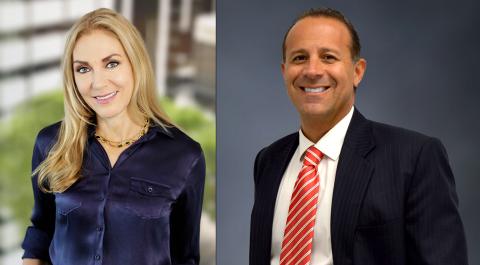Top trends in digital health – insights from the MSIA
Published 29 March 2019
Emma Hossack and Robert Best from the Medical Software Industry Association share their insights with us.
The Medical Software Industry Association (MSIA) has represented the interests of Australia’s health software industry and promoted the value of technology in improving health outcomes for 20 years. Its support has been a key factor in the continuing success of the local Australian software industry. Emma Hossack (CEO) and Robert Best (President) are leading the MSIA in 2019. They provide a collective voice and unique insights and perspectives on the products and services the software industry provides healthcare practitioners and healthcare organisations, as well as contributing to the rapidly developing digital health sector.

Emma Hossack, MSIA CEO, and Robert Best, MSIA President
#Share: What are the hot topics in digital health for the year ahead? There’s a tremendous amount of buzz around things like artificial intelligence (AI) and blockchain, but I wonder if less “buzzy” topics like achieving interoperability will be more important, at least for the coming year.
EH - The amount of buzz around blockchain has settled down recently. Blockchain has useful applications and potential in research, analytics and digital contracts which need authentication. It’s not universally suitable for healthcare though, because in areas such as an operating theatre you need instantaneous response. AI and machine learning on the other hand, have been used to great advantage and will continue to be developed in various applications. For consumers booking an appointment, say, it’s great for the AI to point out that you need your pathology tests done, so you might want to reschedule for another time. AI decision support for clinicians looks very promising and is a burgeoning area for our industry.
RB – Picking up on the AI theme, we’re starting to see lots of reports of AI systems detecting problems more accurately than trained human specialists. That’s not to say that AI is going to replace human specialists, of course. It just means that diagnosticians now have some very powerful tools at their disposal that they didn’t have before. No matter how reliable AI-based diagnoses become, people will always want a human specialist to check that diagnosis and give context to the patient’s specific needs.
EH – Getting interoperability working will create a fluidity of data that will lay the foundations for a lot of other capabilities. Once we have fluidity of health data – with appropriate privacy safeguards of course – a lot of clinical benefits and efficiencies are inevitable. Our industry vision is for a better, more efficient and accessible health system so interoperability is a key goal for our industry.
EH – Other projects that the Agency is working on will have a big impact, such as e-prescribing. GPs can already create electronic prescriptions, but it’s not a fully digital end-to-end process. Having the option to go fully digital will have advantages of security, consumer convenience, and save clinicians time. It can be done with a lot of existing infrastructure already provided by our members which is a big plus.
RB – I think we’ll see significant growth in the “internet of things” in healthcare this year. Wearable devices are already taking off among consumers. We’ll start to see a greater movement towards these kinds of devices talking seamlessly to clinical systems (with the patient’s permission of course), to improve health monitoring, medications management, and a range of other issues.
#Share: Looking beyond Australia, how does our digital health system relate to international developments?
EH – It goes without saying that we keep our eyes on overseas developments and trends. By the same token, our GP clinical practice management software leads the world in its diversity and successful uptake. The whole spectrum of our members - from small one-person outfits to large public, private and NFP organisations - punch above their weight internationally. The eyes of the world really are on us, both for the My Health Record and for the brilliant industry systems which support and extend beyond it.